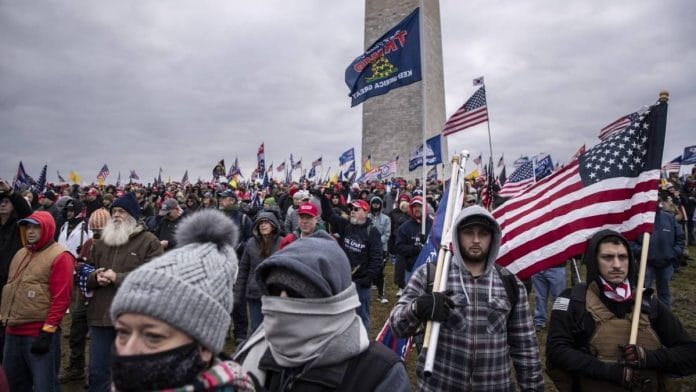America could hardly have been kinder with propaganda gifts to autocrats over the past few months.
First, there was the mishandling of a coronavirus pandemic spiraling out of control; then, chaotic elections that the incumbent refused to concede. Now, the televised storming of Capitol Hill by marauding protesters, virtually unchallenged by police. This is invaluable material for Russia’s Vladimir Putin, China’s Xi Jinping and any other leader eager to portray transitions of power as anarchic and damaging, cementing their own importance as custodians of stability. It helps justify their clampdowns on opposing voices and enfeebles the U.S. in standing up as a meaningful proponent of democracy.
The potential short-term damage is no doubt overdone by the effects of dramatic footage. President-elect Joe Biden will take over in two weeks and the pillars of the U.S. political system are still standing. But the pernicious longer-term impact of events in recent months — culminating with the first large-scale breach of the Capitol since 1814, incited by an elected president — are far more worrying, especially for people fighting for freedom and representation elsewhere. This is not turbulence in the Kyrgyz capital Bishkek after allegations of vote-rigging in October, but a transition of power marred by violence in Washington, D.C.
State media in China, Russia and beyond, having covered November’s election turmoil and Donald Trump’s belligerent speeches with glee, are now beaming images of flag-carrying rioters against the background of the Capitol and, inside, of lawmakers taking cover.
As with a Rorschach inkblot test, everyone is reading into the mayhem what they want. The chief reporter of China’s state-backed tabloid Global Times made a comparison to pro-democracy demonstrators’ incursion into Hong Kong’s Legislative Council in 2019. The paper carried a roundup of online schadenfreude, contrasting images of China’s regimented Covid-19 fight with clashes in Washington.
When Trump supporters storm Capitol, they are called as 'mob' but we've seen exactly the similar scenario happened in #HongKong #LegCo in 2019. Those #US politicians like @SpeakerPelosi who praised #HK rioters as fighters for freedom would see the democracy is failing now. pic.twitter.com/ZtyWO6PKMc
— Qingqing_Chen (@qingqingparis) January 7, 2021
Polish television likened the demonstrators to the country’s own opposition. Maria Zakharova, the usually vocal spokeswoman for Russia’s Ministry of Foreign Affairs, merely shared a post from former CNN Moscow bureau chief and Russia scholar Jill Dougherty: “The United States will never again be able to tell the world that we are a paragon of democracy.”
It’s noteworthy that, for now at least, commentary is sparser than back in November. The images from the ground are enough to do the work of many thousands of words for the world’s propagandists.
Strongman leaders, meanwhile, are mirroring back language normally used by the State Department on distant electoral disarray. Turkey said it was following internal developments with “concern” and called on “all parties in the U.S. to maintain restraint and prudence.” Diosdado Cabello, a senior figure in Venezuelan leader Nicolas Maduro’s political circle, tweeted “I’ll be brief: The USA, what a mess. We will win!” The government condemned “political polarization” and a “spiral of violence that only reflects the profound crisis that the U.S. political and social system is going through.”
Seré breve: EE.UU., que desastre. Nosotros Venceremos!!
— Diosdado Cabello R (@dcabellor) January 6, 2021
There are three worrying consequences in all this. First, it makes peaceful transitions of power more difficult by bolstering the notion that strongmen love to support — that alternating leaders equals pandemonium. The promotion of stability has already helped Putin to justify constitutional changes allowing him to stand again in 2024, when his current term expires. He argues that Russia has little time for the jostling among potential successors. China removed term limits on its presidency in 2018. In both places, an increasingly popular response to silence criticism of anything from governance to the spread of Covid-19 has become: It’s worse over there.
Second, the example of U.S. disarray allows authoritarian leaders, and those teetering on the brink of becoming one, to tighten control over opposition voices. Washington, they will argue, is proof of what happens when extreme, fringe elements run wild, society is allowed to fracture and social media is unbridled.
The third, and perhaps most painful outcome, is that it becomes far harder for the U.S., having failed the most basic test, to act as the beacon of democracy that it has been for decades.
In extremis, this could prove to be, as so many have rushed to say, the U.S. equivalent of the 1923 Munich Putsch. But it’s vital to point out that what happens next is not predetermined. Americans are now waking up to the cold reality of what so many of us who have seen less stable or long-lived systems already know: Democracy can erode fast, if you allow it to.
In fact, what happens next matters almost more than what we’ve just witnessed. The U.S. succeeded in counting its votes in the midst of bedlam back in November. If the country can now act to mend the torn social fabric and repair its politics, it will provide a better lesson in democracy than years of preaching ever could. –Bloomberg
Also read: 4 dead in violence after Donald Trump supporters storm US Capitol






